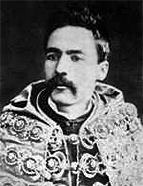

He was born in what was then the civil parish of Castedo, in the municipality of Alijó, in the district of Vila Real. This is a small civil parish where the primary economic activity is agriculture, particularly the production of Port wine (Dicionário Enciclopédico das Freguesias [Encyclopaedic Dictionary of Civil Parishes], vol. 3, [1998], pp. 437-438). According to information from the civil parish council, his parents — Joaquim Lopes Praça and Lucrécia Lopes — were farmers, likely with some financial means. Today, a plaque can be found on the house where he was born, designating him as a "historian of philosophy and jurist," while the place names reflect the family's historical presence in the area, as evidenced by Captain Lopes Praça Square, located next to the old school in Castedo do Douro.
Steered toward an ecclesiastical life by his father's wishes, he began his studies at the seminary in Braga before enrolling at the University of Coimbra in 1863. He initially studied theology and law, but from the fourth year onwards, he chose to focus solely on law, seemingly due to conflicting schedules, indicating his greater interest in a field where significant debates were occurring. During this period, there was bustling academic activity at the University of Coimbra, evident in the challenge to established norms, the pursuit of new forms of artistic expression, renewed philosophical and political inspiration, and a greater dialogue and openness to other cultural realities.
The autobiographical letter from Antero de Quental (who, like Lopes Praça, was a law student in Coimbra) to Wilhelm Storck clearly reflects this atmosphere. Additionally, one of the primary sources of inspiration for these scholars stems from Germanic thinkers or those linked to this cultural sphere. For his part, Eça de Queiroz, who was also a law student at the time, in his Prosas Bárbaras (1866-1867), suggests that Germany could provide the "enlightenment" we require, as it is "full of idealism", in contrast to Italy, which he views as governed by passion (i.e.: representative of the Latin nations). Queiroz advocates for the fusion of these two figures through a rapprochement that enables Portugal to "extend a brotherly hand" to Germany.
This work is financed by national funds through FCT - Foundation for Science and Technology, I.P, in the scope of the projects UIDB/04311/2020 and UIDP/04311/2020.
